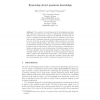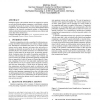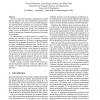106
Voted
APPROX
2004
Springer
15 years 7 months ago
2004
Springer
A quantum encryption scheme (also called private quantum channel, or state randomization protocol) is a one-time pad for quantum messages. If two parties share a classical random s...
114
click to vote
FSTTCS
2005
Springer
15 years 7 months ago
2005
Springer
We construct a formal framework for investigating epistemic and temporal notions in the context of distributed quantum systems. While we rely on structures developed in [DDKP05], w...
108
Voted
EUROCRYPT
2005
Springer
15 years 7 months ago
2005
Springer
It is a standard result in the theory of quantum error-correcting codes that no code of length n can fix more than n/4 arbitrary errors, regardless of the dimension of the coding ...
128
click to vote
COCOON
2005
Springer
15 years 7 months ago
2005
Springer
This paper gives a quantum algorithm to search in an set S for a k-tuple satisfying some predefined relation, with the promise that some components of a desired k-tuple are in som...
156
click to vote
COCO
2005
Springer
15 years 7 months ago
2005
Springer
Consider a two-party quantum communication protocol for computing some function f : {0, 1}n × {0, 1}n → Z. We show that the first message of P can be compressed to O(k) classi...
117
click to vote
ATAL
2005
Springer
15 years 7 months ago
2005
Springer
Intelligent agents in the quantum internet are supposed to operate on networked hybrid quantum computers to individually or jointly accomplish their goals by means of both classic...
108
click to vote
ASIACRYPT
2005
Springer
15 years 7 months ago
2005
Springer
We consider the problem of hiding sender and receiver of classical and quantum bits (qubits), even if all physical transmissions can be monitored. We present a quantum protocol for...
132
click to vote
MICRO
2005
IEEE
15 years 7 months ago
2005
IEEE
Recent experimental advances have demonstrated technologies capable of supporting scalable quantum computation. A critical next step is how to put those technologies together into...
131
click to vote
ISCA
2005
IEEE
15 years 7 months ago
2005
IEEE
: The theoretical study of quantum computation has yielded efficient algorithms for some traditionally hard problems. Correspondingly, experimental work on the underlying physical...
112
click to vote
ISCA
2006
IEEE
15 years 8 months ago
2006
IEEE
We evaluate the performance of quantum arithmetic algorithms run on a distributed quantum computer (a quantum multicomputer). We vary the node capacity and I/O capabilities, and t...



